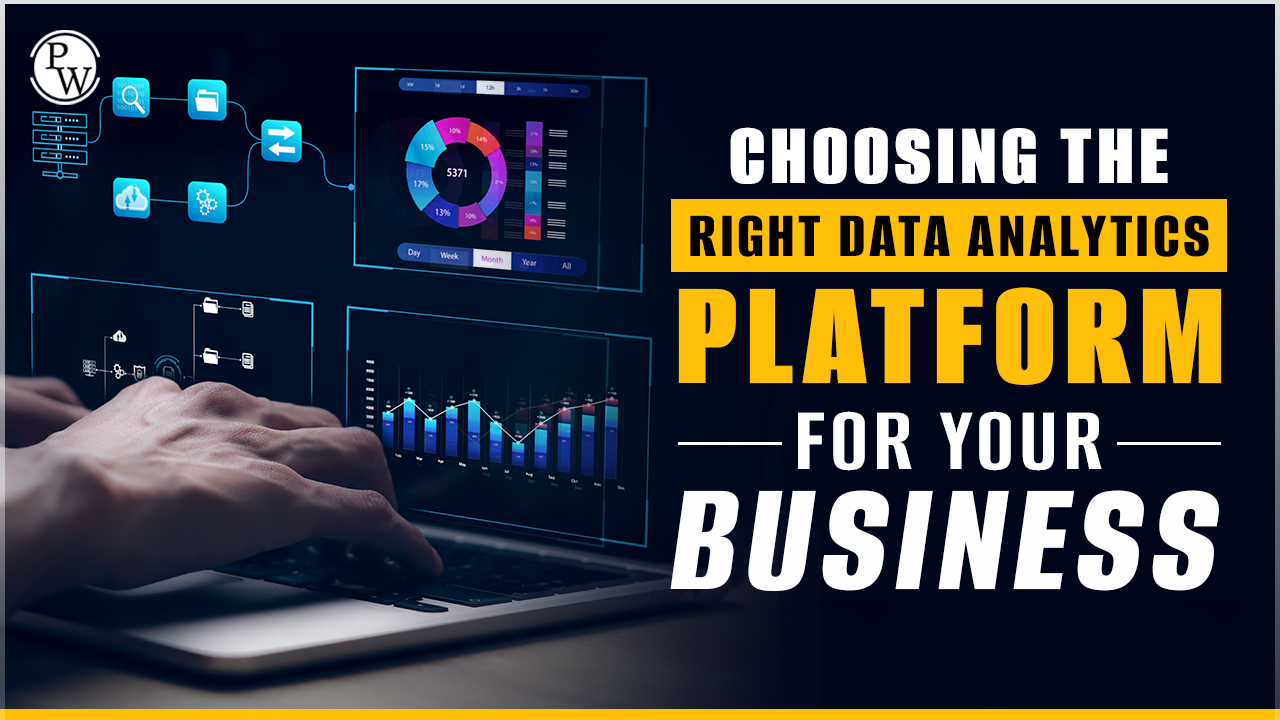Data analytics platform: Are you a business owner considering what data analytics platform is best for your company? Then you’ve come to the right place. Exploring and understanding all of the options available for data analytics platforms can be an overwhelming task.
In this blog post, we’ll provide insights into choosing the right data analytics platform for your business – with considerations such as scale, cost, support structure, and more – so that you can make an informed decision about where to house and analyse your data sets.
Whether you’re a student just getting started in this space or a parent trying to understand how technology is transforming businesses today, read on to learn more about modern methods of capturing and utilizing customer behaviour insights.
Platforms like PW offer the best of all worlds – a low-cost entry point with powerful features plus customizable solutions that can be tailored to meet individual business goals. More than just an analytics provider, PW also provides comprehensive training in data analysis and visualization for developers.
Hence, you can fully control your data and build solutions. For students looking to get ahead in the field of data analytics, PW is an excellent choice – offering essential skills, practical experience, and industry recognition all in one package. So why not take the next step towards mastering full-stack data analytics with PW?
What is a Data Analytic Platform?
A data analytics platform constitutes an integrated system of tools and technologies designed to analyse vast, intricate, and dynamic datasets. Its goal is to make it possible for employees within a firm to retrieve, integrate, engage, explore, and visualize data from many sources.
These platforms strive to transform data into useful insights that lead to significant business outcomes. They cover a variety of skills like predictive analytics, data visualization, location intelligence, natural language processing, and content analytics.

Specifically tailored to address the challenges of handling big data, these platforms surpass traditional relational database management systems (RDBMS) limitations.
They empower organizations to enhance decision-making by providing a comprehensive view and analysis of their data assets.
Key functionalities of an effective big data analysis platform encompass seamless integration of diverse data sources, ensuring data integrity, security, and transparency, as well as continuous monitoring of data, resources, and applications to optimize system health and performance.
An efficient, extensive data analysis, whether dealing with qualitative or quantitative data, offers the potential to describe and summarize data, unveil relationships between variables, compare variables, identify variations, uncover hidden markets, detect unmet customer needs, predict outcomes, and unearth opportunities for cost reduction. In essence, it can drive transformative improvements that significantly impact the overall landscape of a business.
How to Select the Right Data Analytics Platform for Your Business?
Choosing the proper records analytics platform for your enterprise entails cautiously thinking about various factors. Here’s a step-through-step guide to help you make an informed decision:
- Understand Your Business Objectives: Start via figuring out your commercial enterprise goals and targets. Determine what you want to obtain with records analytics, whether improving purchaser revel in, optimizing operations, growing sales, or improving product services.
- Assess Your Data Needs: Analyze the varieties of information your enterprise offers. Consider whether your facts are dependent, unstructured, or semi-established. Also, evaluate the quantity and sort of facts you need to analyze.
- Consider Scalability: Ensure the platform can scale with your business. You don’t want to outgrow your analytics solution as your data and analytics requirements grow. Choose a platform that can accommodate your evolving needs.
- Integration Capabilities: Check how well the platform integrates with your existing systems and data sources. A seamless integration process is crucial for efficient data analysis.
- Data Security and Compliance: Data protection and compliance with regulatory necessities are non-negotiable. Ensure that the platform gives robust safety capabilities and allows you to maintain compliance with applicable laws and guidelines.
- Cost Considerations: Evaluate the total cost of ownership. Consider the upfront costs and ongoing expenses, including licensing, infrastructure, and personnel. Look for a platform that offers a balance between price and features.
- Ease of Use: The platform should be user-friendly. Your team should be able to use it effectively without extensive training. A complex platform may lead to productivity issues.
- Analytics Features: Consider the analytics capabilities, including reporting, data visualization, predictive analytics, and machine learning. Choose a platform that provides the tools you need to derive actionable insights.
- Support and Training: Check the level of customer service and training to be had. You want a provider with dependable aid and resources to assist your team get the most out of the platform.
- Deployment Options: Decide whether you opt for a cloud-primarily based or on-premise analytics platform. Each has its advantages and drawbacks. The choice needs to align along with your enterprise’s IT infrastructure and method.
- Scalability: Ensure the platform can accommodate your business’s growth. Evaluate its ability to scale and adapt to new technologies as your business evolves.
- User Feedback and Reviews: Read user reviews and seek recommendations from businesses similar to yours. This can provide valuable insights into the real-world performance of the platform.
- Pilot Testing: Consider running a pilot project with the selected platform to evaluate its performance in a real business scenario. This can help you make a more informed decision.
- Vendor Reputation: Research the reputation and track record of the platform’s vendor. A reliable and reputable vendor is more likely to provide a quality solution.
- Future-Proofing: Ensure that the platform aligns with future tendencies in data analytics. Look for capabilities that aid rising technologies like Artificial intelligence and machine mastering.
Also read: Comparing Data Analytics Software: Choose Wisely
Benefits of Choosing the Right Data Analytics Platform for Your Business
- Efficient Decision-Making: A well-suited data analytics platform streamlines data processing, enabling quicker and more informed decision-making. Your business can swiftly respond to market changes and trends with the right insights at the right time.
- Cost Optimization: An apt analytics platform helps reduce costs by optimizing resources and improving operational efficiency. It allows you to allocate resources effectively by identifying areas where costs can be minimized without compromising performance.
- Enhanced Productivity: With the right platform, your team can work more productively and collaboratively. Efficient data processing and intuitive interfaces reduce the time to derive insights, allowing your team to focus on implementing strategies rather than struggling with complex tools.
- Data-Driven Innovation: Choosing the right platform ensures that your business can harness the power of data to drive innovation. It allows you to identify new opportunities, tailor products or services, and innovate based on data-backed insights into customer preferences and market demands.
- Scalability and Future-Readiness: The correct analytics platform grows with your business. It accommodates increasing data volumes and complexity, ensuring scalability without compromising performance. This future readiness is vital in the rapidly evolving landscape of data analytics.
Leverage the power of the right analytics platform with the Mastering Full Stack Data Analytics by PW. This course empowers you to unlock the full potential of your analytics platform, enabling you to harness data for strategic decision-making and business growth. Learn to navigate, analyze, and derive actionable insights from data effectively. Enroll now to elevate your analytics capabilities and drive success for your business.
Also read: Benefits of Big Data Analytics – With Examples
Why Choose Mastering Full Stack Data Analytics Course From Physics Wallah?
Choosing the “Mastering Full Stack Data Analytics” course from Physics Wallah offers several compelling reasons:
- Comprehensive Curriculum: The course provides an in-depth and comprehensive curriculum covering all aspects of data analytics. Participants gain a holistic understanding of the field, from fundamentals to advanced techniques.
- Expert Guidance: Physics Wallah, known for quality education, offers expert guidance through experienced instructors. Learners receive personalized attention, clarifications, and insights from professionals well-versed in data analytics.
- Practical Learning: The course emphasizes practical application, ensuring learners acquire hands-on experience. Projects and real-world case studies are integrated, enabling participants to apply their knowledge effectively.
- Flexible Learning Pathways: Physics Wallah offers flexible learning paths to accommodate diverse learning styles and paces. Participants can choose from various schedules, formats, and modes of learning that suit their requirements.
- Career Opportunities: Mastering data analytics opens up vast career opportunities. The course equips learners with the skills and knowledge needed to excel in this growing field, making them highly desirable in the job market.
- Reputation and Credibility: Physics Wallah is a reputable platform for delivering high-quality educational content. Choosing a course from a trusted source ensures credibility and reliability in the educational experience.
The “Mastering Full Stack Data Analytics” course from Physics Wallah stands out for its comprehensive curriculum, expert guidance, practical learning, flexible pathways, promising career prospects, and the platform’s credibility. It’s a valuable choice for anyone aspiring to master data analytics effectively.
Also read: What is Data Analytics? A Complete Guide for Beginners
Data Analytics Tools Used By Companies
Altair
- Altair provides an open, scalable, unified, and extensible data analytics platform integrated with data transformation and predictive analytics tools.
- Altair Monarch offers desktop-based data preparation, while Knowledge Hub facilitates team-driven data preparation and a centralized data marketplace for enhanced collaboration and governance. Machine learning and predictive analytics capabilities are available within Knowledge Studio. Altair Panopticon houses streaming processing and real-time visualization capabilities.
Alteryx
- Alteryx is a self-service data analytics software specializing in data preparation and blending. Alteryx Analytics allows users to organize, clean, and analyze data in a repeatable workflow.
- Business analysts find this tool valuable for connecting to and cleansing data from data warehouses, cloud applications, spreadsheets, and other sources. The platform offers tools to run various analytic jobs (predictive, statistical, spatial) within a unified interface.
Amazon Web Services
- Amazon QuickSight is a serverless and embeddable business intelligence service for the cloud with built-in machine learning capabilities. It enables the creation and publishing of interactive BI dashboards, queryable using natural language.
- The product automatically scales to accommodate thousands of users without additional infrastructure. QuickSight follows a pay-per-session pricing model, ensuring customers only pay when they access dashboards or reports. Dashboards are accessible from any device.
AnswerRocket
- AnswerRocket offers a search-powered data analytics platform designed for business users. The product allows users to ask business questions in natural language, requiring no technical skills to run reports or generate analyses.
- AnswerRocket leverages AI, machine learning, and advanced analytics functionality. The platform automates manual tasks and swiftly answers ad hoc questions. It is mobile-friendly and incorporates native voice recognition.
Domo
- Domo is a cloud-based, mobile-first BI platform that helps companies derive more value from their data. It facilitates better integration, interpretation, and data utilization for timely decision-making and action across the business.
- Domo enhances existing data warehouse and BI tools and allows users to build custom apps, automate data pipelines, and make data science accessible to anyone in the organization through automated insights. These insights can be easily shared with internal or external stakeholders.
Hitachi Vantara
- Hitachi’s Pentaho analytics platform enables organizations to access and blend all types and sizes of data. The product offers a range of capabilities for extensive data integration and preparation.
- The Pentaho platform is purpose-built for embedding into and integrating with applications, portals, and processes, allowing organizations to embed various analytics, including visualizations, reports, ad hoc analysis, and tailored dashboards. Additionally, it extends to third-party charts, graphs, and visualizations via an open API for a broader selection of embeddable analytics.
IBM
- IBM offers various BI and analytic capabilities through two distinct product lines. The Cognos Analytics platform provides an integrated self-service solution that allows users to access data and create dashboards and reports.
- IBM Watson Analytics offers a machine learning-enabled user experience with automated pattern detection, natural language queries, generation support, and embedded advanced analytics capabilities. IBM’s BI software can be deployed on-premises or as a hosted solution via the IBM Cloud.
Microsoft
- Microsoft is a critical player in enterprise BI and analytics, with its flagship platform, Power BI, being cloud-based and delivered on the Azure Cloud. It also offers on-premises capabilities for individual users or when power users are authoring complex data mashups using in-house data sources.
- Power BI stands out by enabling users to perform data preparation, data discovery, and create dashboards using the same design tool. The platform seamlessly integrates with Excel and Office 365, boasting an active user community that extends the tool’s capabilities.
Incorta
- Incorta operates as a data platform expediting data ingestion and enhancing join performance. Marketed as ‘The Industry’s First No-ETL Data Warehouse,’ Incorta features a Direct Data Mapping engine that facilitates real-time aggregation of complex business data, eliminating the need for a data warehouse.
- Users can seamlessly navigate from top-line, aggregated KPIs to supporting transaction records with just a click. Incorta also provides the flexibility to drill anywhere using user-defined drill paths and hierarchies.
Infor Birst
- Infor Birst is a cloud-based analytics solution that interconnects an organization through a network of intertwined virtualized BI instances. The Networked BI platform’s flagship product boasts an adaptive user experience, multi-tenant cloud architecture, user data tier, and a fully virtualized data ecosystem.
- These features enable the use of BI across various regions, product lines, departments, and customers. The product is commonly utilized for BI provisioning, and being cloud-based, it facilitates decentralized analytics.
Looker
- Looker offers a BI and data analytics platform founded on LookML, the company’s proprietary modelling language. The product’s web analytics application emphasizes filtering and drilling capabilities, empowering users to delve into row-level details as needed.
- The embedded analytics in ‘Powered by Looker utilizes modern databases and an agile modelling layer, allowing users to define data and control access. Organizations can use Looker’s full RESTful API or the scheduling feature to deliver reports via email or webhook.
Conclusion
The critical takeaway is choosing a data analytics platform that fits your business’s needs. Consider the type of information your organization handles, what practical uses for data analytics you need help with, and the budget and resources available to you when selecting the right platform.
With its comprehensive curriculum focusing on business intelligence for decision-making, Mastering Full Stack Data Analytics From PW can give students an in-depth understanding of various advanced analytics concepts and tools.
Whether you are a novice or expert in data analytics, it can help you get valuable insights quickly from complex datasets, build predictive/ machine learning models at scale, create dashboards for realizing end-to-end customer journeys, and visualize powerful insights from relevant reports. We urge students to opt for Mastering full-stack Data Analytics from PW as it will allow them to dive deep into the heart of mastering various aspects of data analytics.
Understand the crucial aspects like scalability, integration capabilities, cost, ease of use, data security, and analytics features to make an informed decision. Assess if the platform's capabilities, such as analytics models, align with your business goals, improving customer experience, optimising operations, or enhancing product offerings. Learn about the platform's compatibility with various data types, including structured, unstructured, and semi-structured data, to ensure it can handle your diverse data sources. Understand the pros and cons of both deployment options, considering factors like data security, cost, scalability, and maintenance, to choose the one that suits your business needs. Ensure the platform adheres to data privacy laws and industry regulations and provides features to protect sensitive information and maintain compliance. Evaluate the platform's scalability, flexibility, and ability to adapt to new technologies to ensure it can support your business as it expands and data analytics requirements evolve.Data Analytics Platform: FAQ's
What factors should I consider when selecting a data analytics platform for my business?
How can I determine if a data analytics platform aligns with my business objectives?
What data types can be effectively analysed using a data analytics platform?
Is a cloud-based or on-premise analytics platform better for my business?
How does the platform handle data privacy and compliance with regulatory requirements?
Can the analytics platform accommodate the growth of my business and its evolving data analytics needs?




